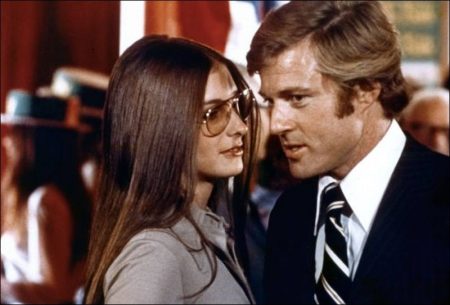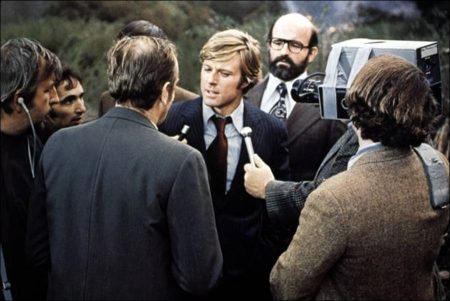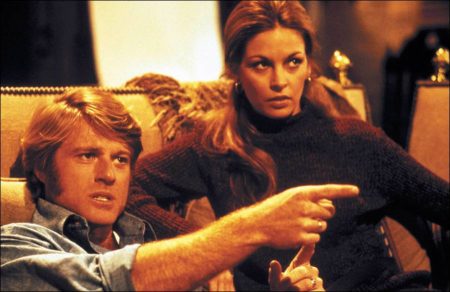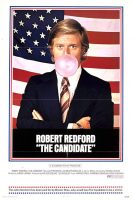Taglines: Nothing matters more than winning. Not even what you believe in.
The Candidate movie storyline. Handsome Bill McKay (Robert Redford) is not his father’s son, his father being former California Governor, John J. McKay. An idealistic civil rights lawyer, Bill believes the political process is all style over substance, and thus he can accomplish more for the people, many of those disenfranchised, in his role as lawyer than politician. For the upcoming midterm election, Bill is approached by strategist Marvin Lucas to contest the Democratic nomination for the California senate seat, the actual election against wildly popular Republican incumbent, Crocker Jarmon.
arvin is able to sell Bill, with his supportive wife Nancy at his side, on the idea as he can easily win the nomination, but has no chance of winning the actual election against Jarmon and thus he can freely speak his mind to the California electorate. Bill’s biggest condition is that his father not be involved at all, Bill not wanting his father’s legacy to overshadow any of his own messages. Unfortunately for Bill, McKay Sr. may influence Bill’s campaign whether or not he is directly involved.
What Bill did not account for is that he has to make a credible showing or else his own reputation as a human being may be in jeopardy. So as the polls continually change for the good or bad for Bill, he may buckle under the pressure to become what he didn’t want to be in the first place. His entire life, including his marriage, may also be totally taken over by the campaign process until election day.
The Candidate is a 1972 American political comedy-drama film starring Robert Redford and Peter Boyle, and directed by Michael Ritchie. The Academy Award–winning screenplay, which examines the various facets and machinations involved in political campaigns, was written by Jeremy Larner, a speechwriter for Senator Eugene J. McCarthy during McCarthy’s campaign for the 1968 Democratic presidential nomination.
About the Production
The character of McKay is based on US Senator John V. Tunney. Director Michael Ritchie worked for Tunney’s campaign in the 1970 Senate election. In the campaign, Tunney’s media adviser had “bulls-eyed the young/old contrast” between Tunney and incumbent opponent George Murphy.
Ritchie, Redford and writer Jeremy Larner spent the whole summer of 1971 putting together the script. The scene where McKay is berated in a men’s room is based on an incident that happened to presidential candidate Eugene McCarthy. In the original script, there was a dialogue planned for McKay’s mistress, however was cut by Redford’s request. Larner, stunned by Redford’s concept of his personal image, stated that “[Redford] told me his public would not accept the mistress as a personality.”
Redford was reunited with Natalie Wood who made a cameo appearance as herself, after she had semi-retired in 1970. The two had co-starred in the 1965 film Inside Daisy Clover, as well as the 1966 film This Property Is Condemned.
The New York Times reviewer Vincent Canby called the film “one of the few good, truly funny American political comedies ever made,” and commented that “The Candidate is serious, but its tone is coldly comic, as if it had been put together by people who had given up hope.” Variety called it “an excellent, topical drama” that was “directed and paced superbly,” adding, “the entire film often seems like a documentary special in the best sense of the word.”
Gene Siskel of the Chicago Tribune gave the film 3.5 stars out of 4 and praised Redford for a “winning performance.” Charles Champlin of the Los Angeles Times wrote that “Redford and Ritchie have teamed again to deliver what I think is nothing less than the best movie yet done about politics in coaxial America… It has a right-now urgency that is strong and compelling.” Roger Ebert later said Ritchie ” brought a sharply observant, almost documentary realism” to the film.
The Candidate (1972)
Directed by: Michael Ritchie
Starring: Robert Redford, Peter Boyle, Melvyn Douglas, Don Porter, Allen Garfield, Karen Carlson, Quinn K. Redeker, Morgan Upton, Jenny Sullivan, Michael Lerner, Kenneth Tobey, Tom Dahlgren
Screenplay by: Jeremy Larner
Production Design by: Gene Callahan
Cinematography by: Victor J. Kemper, John Korty
Film Editing by: Robert Estrin, Richard A. Harris
Set Decoration by: Patrizia von Brandenstein
Art Direction by: Patricia Norris
Music by: John Rubinstein
MPAA Rating: None.
Distributed by: Warner Bros. Pictures
Release Date: June 29, 1972
Views: 326



